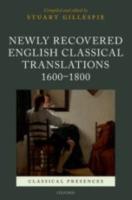
Oxford (2018) h/b 529pp £100 (ISBN 9780198705574)
This handsome volume offers 319 translations of Greek and Latin (some complete poems, some excerpts) by various hands, collected from 159 unpublished manuscripts, a good number of them anonymous. There is also an Annexe of further passages available for study free on line. Most illustrate the easy familiarity of amateurs with the originals, and their confidence in turning them into neat English verse. No Latin or Greek is printed.
This book comes in a series titled ‘Classical Presences’, and belongs in the field of English rather than classical studies. G. is clearly an expert, and has published widely in this area. Though his selection is cautiously presented as a contribution (‘a sampling of unprinted manuscripts’) to ‘reception’, he makes no great effort to trace classical influences or to reconstruct the literary context of these 200 years, preferring to let the versions speak for themselves.
The collection’s chief delight is as an anthology for dipping into, not perhaps unlike the original pieces of paper themselves, which were presumably circulated in a spirit of gentle emulation for the entertainment of friends. G. advances little evidence for authors’ hopes of publication. Most are competent, some brilliant, and only a very few mediocre (G. may have suppressed the worst). Pope’s Iliad they are not, but they share his concern for verbal dexterity and decorum of thought (a couple of Martial epigrams apart).
A prodigious amount of scholarly labour has gone into sourcing these manuscripts from far-flung libraries. The editing is of a high quality, especially the brief but useful biographical notes. Without obtruding, G. gives us just enough context to appreciate the confident inventiveness of educated Englishmen (and some Scots) of this time, when the study of Greek and Latin formed pretty well the entire school and university curriculum. Students of the history of classical studies in England will be interested in the relative popularity of authors translated—assuming that G.’s selection is representative of what was studied: predictably a lot of Horace, Ovid and Virgil, less so Juvenal at his most biting. Martial and Greek epigram are obvious choices, presumably dashed off in an idle half hour.
Anthony Verity
